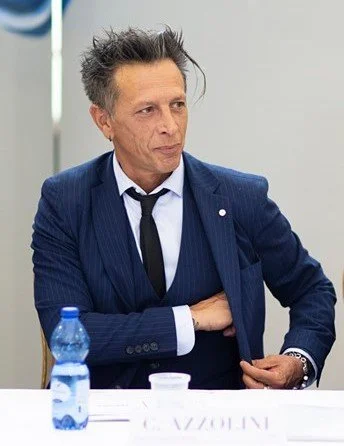Claudio Azzolini
Founder and Organizer Torino Fashion Week, Italy
Claudio Azzolini is the Founder and CEO of Torino Fashion Week and President of Torino Moda (TModa), an international platform dedicated to emerging designers, innovative brands, and fashion SMEs. Through Torino Fashion Week, he has created a global stage that combines catwalks, workshops, talks, and international B2B matchmaking, promoted in collaboration with the Enterprise Europe Network (EEN) and supported by the European Commission. Under his leadership, the event has become a recognized hub for sustainable, innovative, and independent fashion, receiving the European Commission’s Best Practice Award in 2019.
Claudio also serves as Vice President of the Nuova Accademia delle Arti, delle Scienze e delle Professioni and Vice President of UNVS Roma Capitale, where he continues to champion culture, innovation, and sustainability across fashion and the creative industries. His work has been recognized with multiple awards for his contributions to fashion, culture, and social impact.
1. How can the fashion industry scale the adoption of bio-based and circular materials while remaining affordable and accessible to consumers?
Large-scale adoption of bio-based and circular materials requires a synergy between technological innovation, economies of scale, and public incentives. Companies must invest in research to make these materials more efficient and competitive, while governments can support the transition through tax benefits and sustainable procurement policies. Additionally, collaboration between brands and suppliers can reduce costs across the supply chain, making products more affordable without compromising quality..
2. What are the most effective ways to ensure full supply chain traceability and transparency across global fashion brands?
Digitalization is key: technologies such as blockchain, RFID, and cloud platforms enable monitoring of every stage of production, from sourcing to distribution. Transparency must be embedded in corporate culture, through public reporting, independent certifications, and active consumer engagement. Traceability is not just an ethical obligation. it’s a competitive advantage for brands aiming to build trust and reputation.
3. How can the Middle East fashion sector balance rapid growth with sustainable practices, particularly in luxury and fast fashion?
Sustainability must become an integral part of the region’s growth strategy. Luxury brands can lead the shift by investing in ethical materials and local production, while fast fashion can adopt circular models such as recycling and reuse. Collaborations with emerging designers and green startups can accelerate innovation, making sustainability a defining feature of the regional fashion market.
4. How can governments in the region encourage sustainable fashion practices through policy, incentives, and consumer awareness campaigns?
Governments can introduce tax breaks for companies that adopt sustainable practices, fund incubators for green startups, and promote educational campaigns aimed at consumers. Integrating sustainability into school and university curricula can foster a new generation of conscious entrepreneurs. Additionally, public events and themed fashion weeks can amplify the message and actively engage the community.

